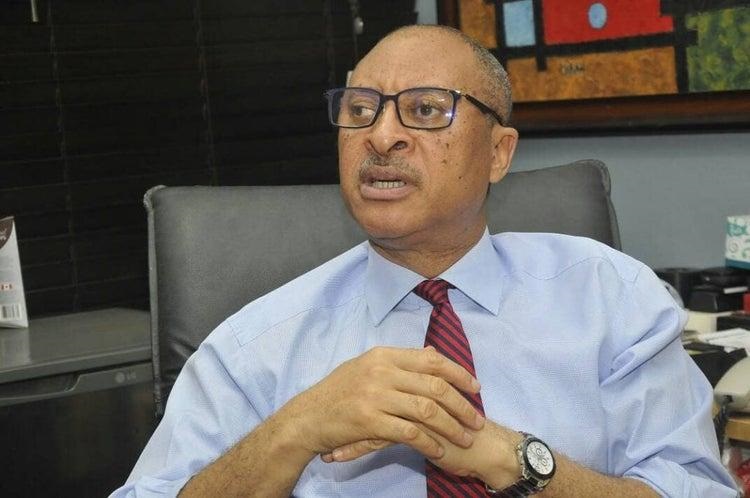The Federal High Court in Abuja, on Monday, made an order of perpetual injunction restraining Prof. Pat Utomi and and his associates from establishing “a shadow government” in the country.
Justice James Omotosho, in a judgment, declared that Utomi’s action was unconstitutional and amounted to creating a parallel government not recognised by the constitution.
Justice Omotosho said he had perused the country’s constitution and there was no part that supports the formation of a shadow or parallel government.
Citing Section 1(1) and (2) of the 1999 Constitution, the judge said the constitution is supreme and binding on all citizens irrespective of political divides.
“The Nigerian constitution makes no room for shadow government.
“Therefore, any participation in any government which is unknown to law will be struck down by this court
“I hereby declared the formation as void,” the judge ruled.
The judge declared the idea of a shadow government or cabinet as unconstitutional and a concept alien to the nation’s presidential system of government.
He said even in the United States of America where Nigeria copied the presidential system of government, there is no space for shadow government.
“It is a notorious fact that Nigeria practises a presidential system of government copied from the USA.
“Unlike in the parliamentary system where the prime minister is not elected directly by the electorates.
Shadow government is a popular term used to described parallel government formed by the largest opposition party in parliamentary system of government.
“Presently, the UK shadow government is led by Kemi Badenoch of the Conservative Party.
“Though they don’t have executive power, the shadow government mirrors the sitting government and offers alternative proposal pending electoral victory.
“Therefore, it is not a feature of a presidential system of government.
“Under the presidential system, the president emerges from a presidential election unlike when the prime minister emerges from the parliament,” he said.
The judge held that Utomi and his associates cannot hide under the rights to freedom of association and expression to engage in unlawful activities.
He upheld the arguments of the Department of State Services (DSS)’s counsel, Akinlolu Kehinde, SAN, that Utomi’s action portends danger to the peace and security of Nigeria.
He held that the move by Utomi and his associates to form a shadow government was intended to create chaos and destabilise the country.
The judge also agreed with the DSS that, not only is the planned shadow government an aberration, it constitutes a grave attack on the constitution and a threat to the democratically elected government that is currently in place.
He held that such a structure, styled as a shadow government, if left unchecked, may incite political unrest, cause intergroup tensions, and embolden other unlawful actors or separatist entities to replicate similar parallel arrangements, all of which pose a grave threat to national security.
Justice Omotosho held that although the defendant is entitled to enjoy the rights to freedom of expression and associate, such rights are not absolute.
He further held that the two rights being claimed by the defendant could legally be violated in some instances, particularly where there is the need to protect the society from anarchy and breakdown of law and order.
He held that, in the interest of the security of the country, such rights (freedom of expression and association) do not exist for the defendant, warning that the court will not sit idle to allow the defendant to cause confusion in the country.
The judge said Utomi, although claimed to be running a civil society organisation, his decision to form a shadow government is a nullity.
The judge noted that there are existing avenues through which people could criticise the government, which the defendant could explore, but not to take unconstitutional steps, like forming shadow government.
Justice Omotosho also faulted the avenue adopted by Utomi and his associates, noting that the Big Tent Limited, a limited liability company under which the defendant claimed to be operating, cannot be used as a vehicle for political purposes as was done in this case.
He said the plan to use the company to project their idea of parallel government contradicts the Company and Allied Matters Act (CAMA), 2020.
He said should Utomi and his associates wish to set up a platform to criticise and monitor the government, they should either form a political party or join existing one, not to use a limited liability company for political purposes.
He proceeded to issue an order declaring the purported shadow government as unconstitutional and amounts to an attempt to create a parallel authority not recognised by the Constitution of the Federal Republic of Nigeria, 1999 (as amended).
Justice Omotosho also declared that under Sections 1(1), 1(2) and 14(2)(a) of the constitution, the establishment or operation of any governmental authority or structure outside the provisions of the constitution of the Federal Republic of Nigeria, 1999 (as amended). is unconstitutional, null, and void.
The judge, therefore, issued an order of perpetual injunction, restraining Utomi, from further taking any steps towards the establishment or operation of a shadow entity not recognised by the Constitution of the Federal Republic of Nigeria, 1999 (as amended).”
Earlier, the judge affirmed the jurisdictional power of the court to entertain the matter.
Justice Omotosho, who recognised the contributions of the seven amici curiae (friends of the court) invited, thanked the plaintiff for taking the step to file the matter, saying “it will enrich our jurisprudence.”
The News Agency of Nigeria (NAN) reports that the DSS had, in the suit marked: FHC/ABJ/CS/937/2025, dragged Utomi, a Professor of Political Economy and Management Expert, to court.
The court, in dealing with the novel issues of “shadow government,” had invited some eminent legal experts for their professional inputs.
The judge had, on July 10, fixed today for judgment after DSS’ counsel, Mr Kehinde; Utomi’s lawyer, Chief Mike Ozekhome, SAN, and the seven invited amici curiae made their submissions for and against the suit.





